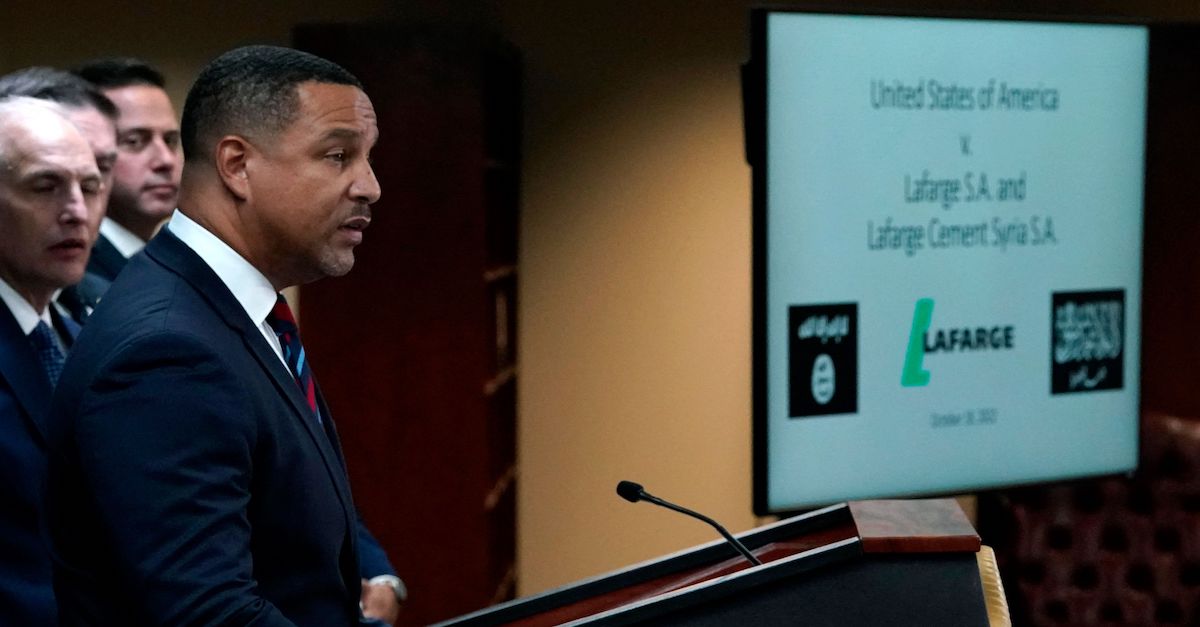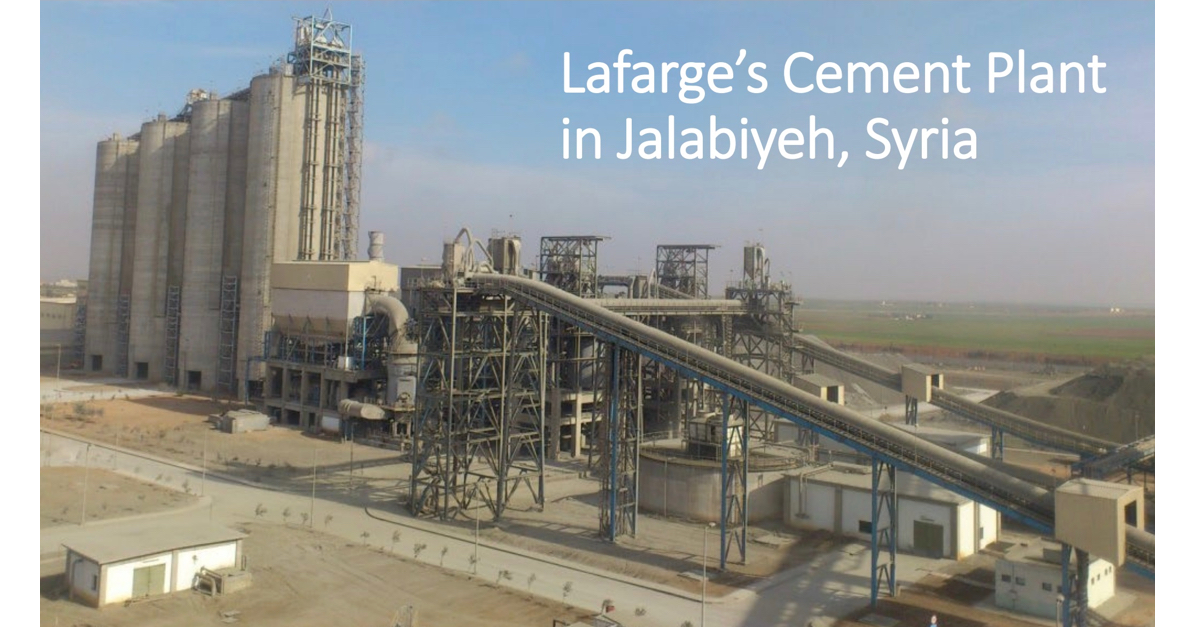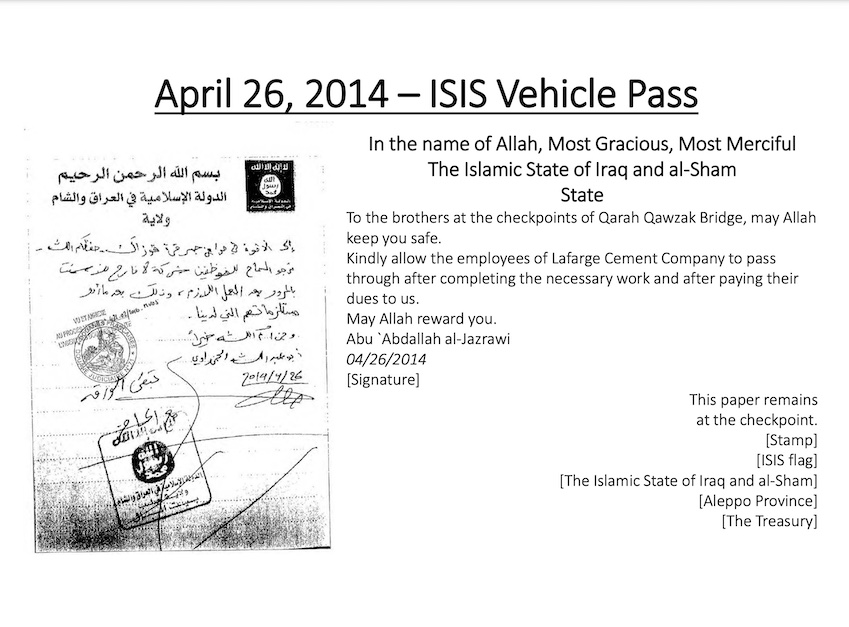
Eastern District of New York US Attorney Breon Peace speaks during a press conference in New York City on October 18, 2022. – French cement giant Lafarge SA will pay a $778 million fine after pleading guilty to providing material support to Islamic State and other terror groups during the Syrian civil war, the US Justice Department announced.
In a first for the U.S. Department of Justice, a multinational corporation has admitted to paying terrorist organizations in Syria for protection — and sharing profits with the terrorist groups — during that country’s civil war. The company will pay nearly $800 million in sanctions as a result.
Worldwide manufacturing company Lafarge has pleaded guilty to providing material support to foreign terrorist organizations, Breon Peace, the U.S. Attorney for the Eastern District of New York, announced during a press conference Thursday from the district’s federal courthouse. It’s the first case of providing corporate material support to a terrorist organization that the DOJ has pursued.
“Today, I announce the historic guilty pleas of two companies for conspiring to provide material support to foreign terrorist organizations,” Peace said, according to the DOJ, citing Lafarge S.A. and Lafarge Cement Syria S.A. as the companies and ISIS and the al-Nusrah Front (ANF) as the terrorist organizations. “These are the first companies ever charged by the Justice Department with providing material support to foreign terrorist organizations.”
Peace said that Lafarge agreed to pay $777.78 million as a sentence for the conduct.
“This sentence is well deserved, because in 2013 and 2014, Lafarge made a deal with the devil — foreign terrorists who pledged to and in fact did harm the United States, its people, and its national security — for profit,” Peace said.
Lafarge is a France-based company that manufactures cement and other materials in more than 60 countries worldwide. From 2010 to 2014, Lafarge subsidiary Lafarge Cement Syria (LCS) operated a cement plant in Jalabiyeh, in the northern part of Syria near the Turkish border. According to the DOJ, the plant cost approximately $680 million to build.

image via DOJ.
When civil war broke out in Syria in 2011, ISIS and ANF took control of territory in Syria and, according to the DOJ, committed “numerous terrorist acts” that resulted in the deaths of many U.S. citizens, among others.
The following year, Lafarge and LCS started paying “various armed groups for protection,” Peace said.
“By August 2013, if not earlier, some of those payments were made to ISIS and ANF, two groups that Lafarge knew were designated as foreign terrorist organizations by the United States,” Peace said, adding that the payments were meant to ensure the safety of LCS employees and the continued operations of the plant.
“While paying armed groups for the privilege of running a business was bad enough, the payments evolved in even more disturbing ways,” Peace said.
According to the DOJ, that included buying raw materials from ISIS-controlled suppliers and eventually entering into revenue-sharing agreements with ISIS.
“In exchange, LCS was allowed to operate and generate tens of millions of dollars,” the DOJ said.
The company even obtained “vehicle passes” from ISIS that allowed employees, suppliers, and customers to pass checkpoints controlled by ISIS.
“To the brothers at the checkpoints of Qarah Qawzak Bridge, may Allah keep you safe,” the pass says, according to the DOJ. “Kindly allow the emplyees of Lafarge Cement Company to pass through after completing the necessary work and after paying their dues to us.”

via DOJ.
“In other words, in exchange for paying ISIS, and sharing revenue with ISIS, Lafarge and LCS were able to conduct business as usual,” the DOJ said.
As time went on, the relationship between Lafarge and ISIS got even closer, the DOJ said, with the manufacturing company not only seeking out permission to operate from ISIS, but the terror group’s “assistance in blocking or taxing competitors who imported cheaper cement into Syria from Turkey.”
“The decision to become business partners with ISIS was extraordinary,” Peace said. “Leveraging ISIS to harm competitors defies belief – but it really happened.”
Lafarge employees and executives took steps to “conceal this scheme.” According to the DOJ:
- They asked that the agreements with ISIS not name Lafarge, and instead refer to the cement plant generically.
- Lafarge and LCS executives also frequently used personal email accounts, rather than their corporate email addresses, to communicate about the illicit arrangements, to further hide their conduct.
- They created invoices with false descriptions of the identities and work of the intermediaries who brokered deals with terrorists.
In one case, executives created a “backdated contract-termination agreement, falsely showing that the intermediary’s relationship with LCS was terminated on August 18, 2014, the business day after the UN Security Council called on member states to prohibit business relationships with ISIS,” the DOJ said.
The executives also executed a “sham consulting agreement with the intermediary that was purportedly for ‘security consulting,'” but which was actually to “settle the intermediary’s outstanding balance for negotiating with and paying ISIS.”
The DOJ says that Lafarge paid ISIS and ANF the equivalent of approximately $5.92 million over the course of the scheme, and around $1.11 million to third-party intermediaries for negotiating with, and making payments to, ISIS and ANF.
ISIS continued to make money from the arrangement even after LCS evacuated the plant in September 2014, when the organization took cement LCS had produced and sold it incrementally for what would amount to around $3.21 million.
“Let me pause to let that all sink in,” Peace said. “The defendants paid millions of dollars to ISIS, a terrorist group that otherwise operated on a shoestring budget. Millions of dollars that ISIS could use to recruit members, wage war against governments, and conduct brutal terrorist attacks worldwide, including against U.S. citizens.”
The DOJ says that Lafarge ultimately brought in some $70.30 million in revenue in Syria from August 2013 through 2014, during the civil war, and “hoped to earn far more when the war ended and LCS could exploit its dominant position.”
“This conduct, by a Western corporation, was appalling, and has no precedent or justification,” Peace said.
In a statement, Lafarge said that none of the conduct involved the company’s operations or employees in the U.S., and the executives involved are no longer with Lafarge or any of its affiliated entities.
“Lafarge SA and LCS have accepted responsibility for the actions of the individual executives involved, whose behavior was in flagrant violation of Lafarge’s Code of Conduct,” the statement said. “We deeply regret that this conduct occurred and have worked with the U.S. Department of Justice to resolve this matter.”
The statement added emphasized that the DOJ’s investigation “did not find that any of the individuals who were involved in the conduct shared or supported the methods, goals or ideologies of the terrorist groups that were operating in the area,” and noted that the conduct occurred “during a period of intense violence and coercive pressure from terrorist groups, as LCS tried to manage the grave security challenges in the area surrounding its cement plant during the Syrian civil war.”
The statement added that the company is fully cooperating with French authorities in their investigation and “will defend itself against any judicial actions that it regards as unjustified in the French proceedings.”
Read the statement of facts, which sets forth the conduct to which Lafarge has pleaded guilty, here.
[Photo by Timothy A. Clary/AFP via Getty Images.]